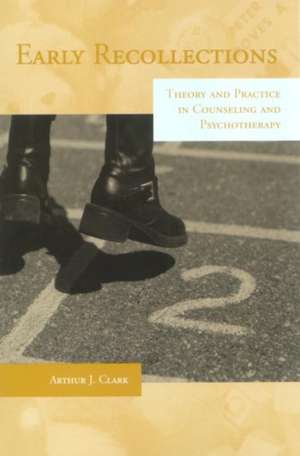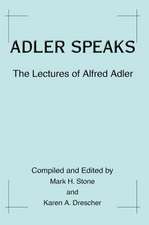Early Recollections: Theory and Practice in Counseling and Psychotherapy
Autor Arthur Clarken Limba Engleză Paperback – 19 iul 2002
| Toate formatele și edițiile | Preț | Express |
|---|---|---|
| Paperback (1) | 223.48 lei 6-8 săpt. | |
| Taylor & Francis – 19 iul 2002 | 223.48 lei 6-8 săpt. | |
| Hardback (1) | 1033.60 lei 6-8 săpt. | |
| Taylor & Francis – 12 iul 2002 | 1033.60 lei 6-8 săpt. |
Preț: 223.48 lei
Preț vechi: 281.45 lei
-21% Nou
Puncte Express: 335
Preț estimativ în valută:
42.76€ • 44.77$ • 35.38£
42.76€ • 44.77$ • 35.38£
Carte tipărită la comandă
Livrare economică 05-19 aprilie
Preluare comenzi: 021 569.72.76
Specificații
ISBN-13: 9781583913710
ISBN-10: 1583913718
Pagini: 256
Ilustrații: 14 color images
Dimensiuni: 152 x 229 mm
Greutate: 0.47 kg
Ediția:1
Editura: Taylor & Francis
Colecția Routledge
Locul publicării:Oxford, United Kingdom
ISBN-10: 1583913718
Pagini: 256
Ilustrații: 14 color images
Dimensiuni: 152 x 229 mm
Greutate: 0.47 kg
Ediția:1
Editura: Taylor & Francis
Colecția Routledge
Locul publicării:Oxford, United Kingdom
Public țintă
Professional Practice & DevelopmentCuprins
Part I: Early Recollections: Introduction, Theoretical Perspectives, and Research
1.Introduction of Early Recollections
Introduction
Advantages of Early Recollections in Counseling and Psychotherapy
Disadvantages of Early Recollections in Counseling and Psychotherapy
Early Recollections in a Contextural and Developmental Model
Early Recollections in a Case Illustration
2. Theoretical Perspectives of Early Memories
Introduction
Alfred Adler's Perspectives in Early Memories
Sigmund Freud's Perspectives on Early Memories
Recovered Memories, False Memories, and Early Recollections
3. Taxonomic Considerations and Personality Dimensions of Early Memories
Introduction
Taxonomic Investigations
Personality Dimensions
Summary
4. Diagnostic Impressions of Early Recollections
Introduction
Clinical Disorders
Personality Disorders
Summary
Part II: Early Recollections: Scoring Systems, Administration, and Interpretation
5. Scoring Systems of Early Recollections
Introduction
Scoring Systems
Contextural Assessment
Summary
6. Administration of Early Recollections
Introduction
General Administration Procedures
Situational Administration Procedures
Summary
7. Interpretation of Early Recollections
Subjective, Interpersonal, and Objective Perspectives
Organizing and Synthesizing Early Recollections Perspectives
Summary
8. Training and Practice of Early Recollections
Introduction
Training in Early Recollections
Practice Exercises in Early Recollections
Summary
Part III: Early Recollections: Applications in Counseling and Psychotherapy
9. Early Recollections in the Counseling Process
Introduction
Theoretical Considerations
The Counseling Process
Application Issues and Variations in the Use of Early Recollections
Summary
10. Early Recollections in the Counseling Process: A Case Study
The Counseling Process
References
About the Author
Index
1.Introduction of Early Recollections
Introduction
Advantages of Early Recollections in Counseling and Psychotherapy
Disadvantages of Early Recollections in Counseling and Psychotherapy
Early Recollections in a Contextural and Developmental Model
Early Recollections in a Case Illustration
2. Theoretical Perspectives of Early Memories
Introduction
Alfred Adler's Perspectives in Early Memories
Sigmund Freud's Perspectives on Early Memories
Recovered Memories, False Memories, and Early Recollections
3. Taxonomic Considerations and Personality Dimensions of Early Memories
Introduction
Taxonomic Investigations
Personality Dimensions
Summary
4. Diagnostic Impressions of Early Recollections
Introduction
Clinical Disorders
Personality Disorders
Summary
Part II: Early Recollections: Scoring Systems, Administration, and Interpretation
5. Scoring Systems of Early Recollections
Introduction
Scoring Systems
Contextural Assessment
Summary
6. Administration of Early Recollections
Introduction
General Administration Procedures
Situational Administration Procedures
Summary
7. Interpretation of Early Recollections
Subjective, Interpersonal, and Objective Perspectives
Organizing and Synthesizing Early Recollections Perspectives
Summary
8. Training and Practice of Early Recollections
Introduction
Training in Early Recollections
Practice Exercises in Early Recollections
Summary
Part III: Early Recollections: Applications in Counseling and Psychotherapy
9. Early Recollections in the Counseling Process
Introduction
Theoretical Considerations
The Counseling Process
Application Issues and Variations in the Use of Early Recollections
Summary
10. Early Recollections in the Counseling Process: A Case Study
The Counseling Process
References
About the Author
Index
Notă biografică
Arthur J. Clarke, Ed.D., is a Professor and Coordinator of the Counseling and Development Program at St. Lawrence University in Canton, New York. He is an editorial board member of the Journal of Counseling and Development and the author of Defense Mechanisms in the Counseling Process.
Recenzii
"This is a long overdue book on a very important topic. The overall scope and thoroughness of Early Recollections is of the highest quality. It offers very solid theory and practice and Clark makes a strong case for readers to begin to use early recollections by making everything so practical." -- Jon Carlson, Psy.D., Ed.D., ABPP Distinguished Professor, Governors State University
"Dr. Clark has completed an exceptionally thorough literature review of Adlerian and early recollections theory and research and has integrated this research in a comprehensive, well articulated, carefully organized and thorough presentation. He clearly is a master of the Adlerian approach and shares his knowledge in a clear and cogent manner. His book represents the state of the art in this area of study." -- Jane E. Myers, Ph.D., LPC Professor, University of North Carolina at Greensboro
"Dr. Clark has completed an exceptionally thorough literature review of Adlerian and early recollections theory and research and has integrated this research in a comprehensive, well articulated, carefully organized and thorough presentation. He clearly is a master of the Adlerian approach and shares his knowledge in a clear and cogent manner. His book represents the state of the art in this area of study." -- Jane E. Myers, Ph.D., LPC Professor, University of North Carolina at Greensboro



















